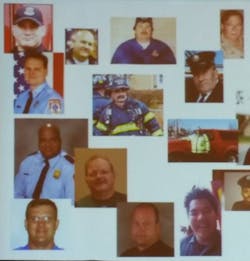Group Gathers to Discuss Cardiac Disease, Deaths in the Fire Service
WASHINGTON, D.C. – The statistics are staggering – heart attacks are the leading cause of deaths for firefighters.
Firefighting takes a toll on the entire body, especially the cardiovascular system, Dr. Denise Smith told fire officials Thursday morning at a conference hosted by the National Fallen Firefighters Foundation.
Over the next two days, researchers will not only share their results of recent studies, but work with officers on how to use the information to improve firefighters’ health.
The Heart to Heart conference is being held to strategize an evidence-based approach to reduce cardiac disease and death in the fire service.
Studies show cardiac deaths are not discriminatory. They kill volunteers and career personnel alike, and while the median age is 52.8, younger firefighters are stricken as well.
The youngest in recent years was a 19-year-old firefighter from Virginia, while the oldest was 86 from Kentucky.
Kevin Roche, a conference organizer, said while attendees will receive study results and statistics over the next few days, he aims to personalize the presentation – to honor those who have been stricken while performing their duties.
Smith said firefighting activities are physically demanding, and crews face a “myriad of dangers on the fire scene.”
While firefighters emerge from a fire, open their coats, and remove their helmets and say they feel better, that’s far from reality.
She noted that their core temperatures continue to rise, and it takes a while for the body to recover. Hydration and fitness factor in the time to rejuvenate.
Smith said she’s interested in not only sharing what the studies have determined, but hearing what firefighters think is important.
“It’s all about partnerships,” she said, adding that it’s essential that departments utilize the data when they’re making regulations.
NFFF Executive Director Ron Siarnicki agrees saying that it’s important the life-saving documents make it into the hands of firefighters and not simply sit on a shelf.
